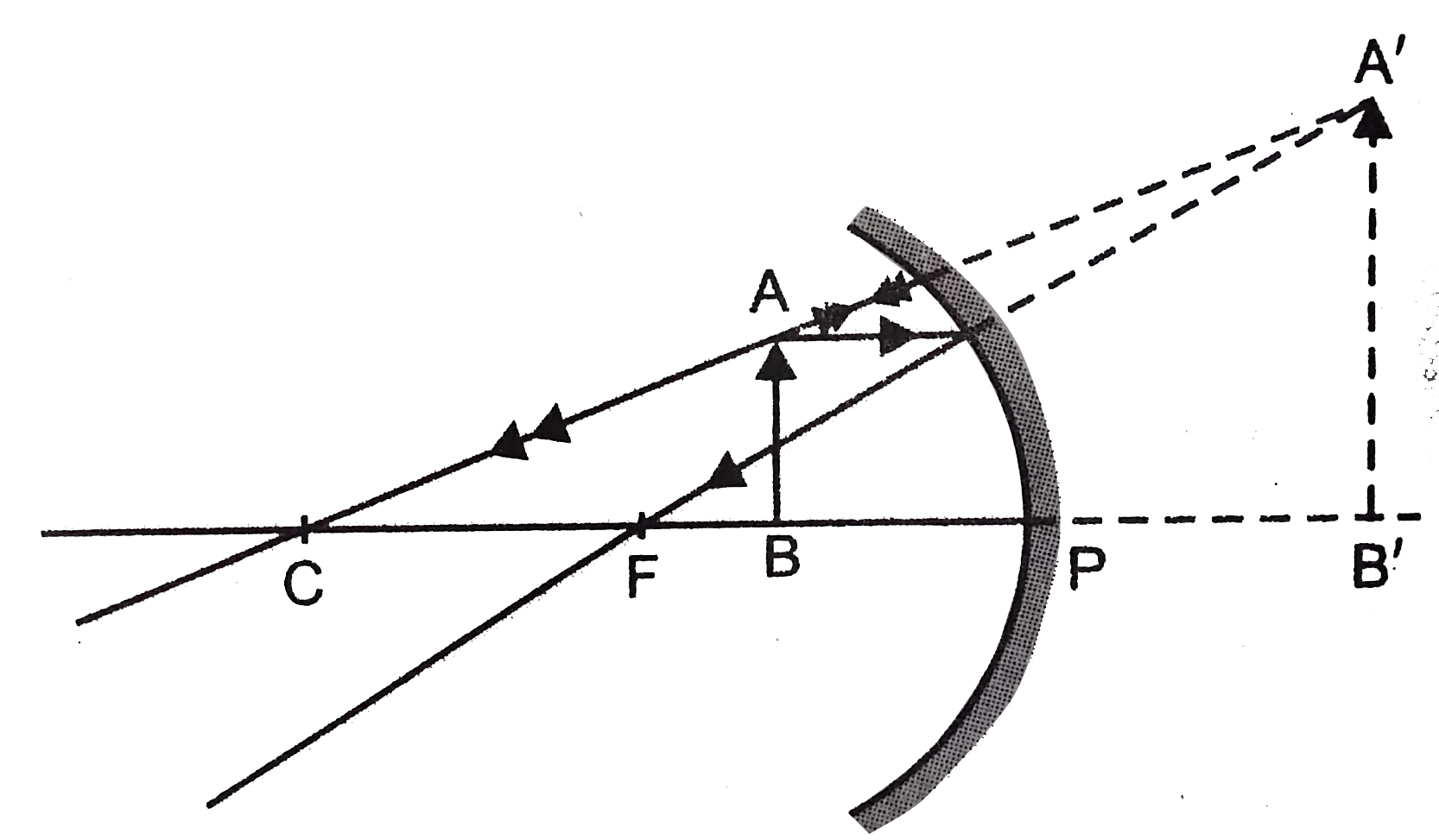(a) To construct a ray diagram, we use two rays which are so chosen that it is easy to know their directions after reflection from the mirror. List two such rays and state the path of these rays after reflection in case of concave mirrors. Use these two rays and draw ray diagram to locate the image of an object placed between pole and focus of a concave mirror.
(b) A concave mirror produces three times magnified image on a screen. If the object is placed 20 cm in front of the mirror, how far is the screen from the object?
(a) In fig. object AB is placed between pole P and focus F of concave mirror. A ray of light incident on the mirror in a direction parallel to principal axis passes through focus F on reflection from the mirror. Another ray, passing through centre of curvature (C) of mirror falls normally on the mirror, and retraces its path on reflection from the mirror. The image so formed is A'B', which is virtual, erect and magnified.
(b) Here, m−3, u=−20cm
From m=vu
−3=v−20,v=60cm
Distance of screen from the object =|v|−|u|=60−20=40cm

Topper's Solved these Questions
- BOOK - PRADEEPCHAPTER - REFLECTION AND REFRACTIONEXERCISE - NCERT QUESTION14videos
REFLECTION AND REFRACTION
- BOOK - PRADEEPCHAPTER - REFLECTION AND REFRACTIONEXERCISE - NCERT EXERCISE17videos
REFLECTION AND REFRACTION
- BOOK - PRADEEPCHAPTER - MAGNETIC EFFECTS OF ELECTRIC CURRENTEXERCISE - Mock Test21videos
MAGNETIC EFFECTS OF ELECTRIC CURRENT
- BOOK - PRADEEPCHAPTER - SOURCES OF ENERGYEXERCISE - Mock Test20videos
SOURCES OF ENERGY
Similar Questions
To construct a ray diagram we use two rays of light which are so chosen that it is easy to determine their directions after reflection from the mirror. Choose these two rays and state the path of these rays after reflection from a concave mirror. Use these two rays to find the nature and position of the image of an object placed at a distance of 15 cm from a concave mirror of focal length 10 cm.
View SolutionTo construct a ray diagram we use two rays of light which are so chosen that it is easy to determine their directions after reflection from the mirror. Choose these two rays and state the path of these rays after reflection from a concave mirror. Use these two rays to find the nature and position of the image of an object placed at a distance of 15 cm from a concave mirror of focal length 10 cm.
View Solution
Knowledge Check
- Question 1 - Select One
After reflection, the light rays from a point object at the focus of a concave mirror,
Aemerge perpendicular to the principal axis.Bemerge parallel to the principal axis.Cform real image.DBoth (b) and (c) - Question 2 - Select One
The light rays from a point object placed at the focus of a concave mirror, after reflection
Aemerge perpendicular to the principal axis.Bemerge parallel to the principal axis.Cform real image.DBoth (b) and (c) - Question 3 - Select One
The light rays from a point object placed at the focus of a concave mirror, after reflection
Aemerge perpendicular to the principal axis.Bemerge parallel to the principal axis.Cform real image.DBoth (b) and (c)
To construct a ray diagram we use two rays of light which are so chosen that it is easy to determine their directions after reflection from the mirror. Choose these two ras and state the path of these rays after reflection from a concave mirror . Use these two rays to find the nature and position of the image of an object plced at a distance of 15 cm from a concave mirror of focal length 10 cm.
View Solution(i) State laws of refraction and explain Snell's law.
(ii) To construct a ray diagram we use two light rays which are so chosen that it is easy to know their directions after reflection from the mirror. List these two rays and state the path of these rays after reflection. Use these two rays to locate the image of an object placed between infinity and the pole of a convex mirror.View Solution(a) To construct a ray diagram we use two light rays which are so chosen that it is easy to know their directions after reflection. Use these two rays to locate the image of an object placed between infinity and the centre of curvature of a concave mirror.
(b) Draw a ray diagram to show the formation of image of an object placed between the pole and principal focus of a concave mirror. How will the nature and size of the image formed change, if the mirror is replaced by a converging lens of same focal length?View SolutionWith the help of a ray diagram, show the formation of an image of an object placed between principal focus and centre of curvature of a concave mirror.
View SolutionThe light rays from a point object placed at the focus of a concave mirror, after reflection
View Solution

